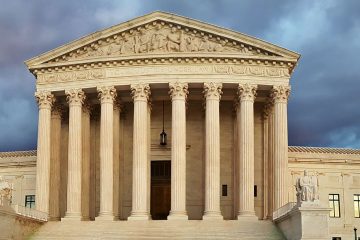
Marijuana Legalization by Blunt Force: A Decade of US Policymaking through Ballot Initiatives
Election day 2020 was another big moment for drug policy reform in the US as voters across diverse states rejected the status quo and endorsed liberalizing drug laws. Arizona, Montana, New Jersey and South Dakota legalized marijuana for recreational purposes as the news proclaimed voters had “just said no to America’s war on drugs,” calling it “a banner year for drug decriminalization.” That election day brought significant wins for drug policy reform is not new. Beginning in 2012 with Colorado and Washington state, 13 out of the 15 states that have legalized recreational cannabis thus far have done so through ballot measures.[1] In 2014, Alaska and Oregon followed suit along with Nevada, Massachusetts, Maine and California in 2016 and Michigan …
Q&A with “A Second Chance” filmmaker Rex Bloomstein: the state of prison rehabilitation in the UK
You probably don’t think too much about the person who copies your keys at the local shop, repairs your shoes or takes your new passport photo. But if that shop is owned by the Timpson Group, chances are their management has. Timpson is one of a few employers in the UK actively recruiting and training people within prisons to work in their shops, which include Max Spielmann, Timpson Locksmiths and Snappy Snaps. Under an effort by CEO James Timpson, the company currently employs about 600 ex-offenders. This training and employment scheme is the subject of A Second Chance, a new full-length documentary, directed by filmmaker Rex Bloomstein and co-produced with Justin Temple. Bloomstein, who has made films on the criminal justice system since the 1970s, …

Who is Afraid of Supreme Court Justice Brett Kavanaugh?
President Donald Trump’s nomination of Brett Kavanaugh to the US Supreme Court has unsurprisingly been greeted by delight from the Right and despair from the Left. The chance to remake the image of the Supreme Court for decades to come with the nomination of a relatively young and reliably conservative justice is dreaded by some and celebrated by others. The significance of Kavanaugh’s – virtually guaranteed – confirmation to the Supreme Court is compounded by the fact that he would replace justice Anthony Kennedy. Kennedy has long been the decisive “swing vote,” who sometimes siding with the four conservative justices and sometimes with the four liberal justices. Being the deciding vote on many cases, Justice Kennedy played an outsized role in …

Brexit Buyers’ Remorse? Non, on ne bregrette rien
The vote to leave the EU was an outcome which surprised most commentators, bookies, and even those who voted for the winning side. In the aftermath of the result, John Gray, a popular political theorist, wrote that ‘voters inflicted the biggest shock on the establishment since Churchill was ousted in 1945’. It is hard to think that he is wrong. The only social classes which predominately voted Remain were ABs (affluent and middle-class voters), whereas C1 C2 DE (lower middle-class and working-class) voters all delivered majorities for Leave. As I predicted on this blog in January and contrary to many commentators’ expectations, the referendum engaged more voters than recent general elections. It generated the highest turnout in a UK election …

Could Iran be the next country to legalise cannabis and opium?
After Uruguay courageously legalised the use of cannabis under a new drug policy, could Iran be the next country to make it legal? From the outside, the image of Iran as retrograde and inherently conservative hardly fits with the reality of a more dynamic domestic political debate within. But drug policy is one of the areas of debate in which the Islamic Republic has produced some interesting, yet paradoxical, policies. Iran has a conspicuous drug addiction problem – which officially accounts for more than 2m addicts (though unofficial figures put this as high as 5-6m). Drug traffickers risk harsh punishments that include the death penalty. Yet Iran also has very progressive policies towards drug addiction, which include distribution of clean …

Experimenting with citizens’ assemblies in the UK
In October and November, two citizens’ assemblies will be taking place in Sheffield and Southampton. Organised by a coalition of academics and civil society organisations under the banner Democracy Matters, Assembly North and Assembly South represent significant interventions in contemporary British politics. First, the assemblies will be dealing with a fundamental constitutional question: how should we be governed? The main focus of the assemblies will be devolution and decentralisation of power to English regions. The Devolution Deals that are current government policy are piecemeal reforms. And as the term ‘Deal’ suggests, they are stitched together by local and national elites: citizens have had no say in how they should be governed. Following the much publicised Devolution Deal for Greater Manchester, …

So, what was Magna Carta?
This year, we celebrate the eight-hundredth anniversary of one of the most revered documents in English history. On 15 June 1215 at Runnymede (a small meadow outside of London, marking the midpoint between two armies locked in civil war) King John set his seal on Magna Carta – the ‘great charter’ that has become synonymous throughout the world with opposition to arbitrary rule, and with the protection of individual rights and liberties. But what, exactly, was Magna Carta? Few of John’s contemporaries could have guessed at its enduring and universal significance. Magna Carta was the product of a specific breakdown in feudal authority. It was a peace treaty and a political settlement, aimed at bringing to an end months of …

The Democracy Commission: practically teaching democracy
The institutions, technologies and practices of British democracy are, for the most part, inventions from before the time of universal suffrage. In the fluidity and fracture of the 21st century, it is clear this democratic inheritance has become increasingly inadequate. Sharp, sustained differences in participation and voice by age, class, ethnicity and region have become entrenched. Politics has professionalised, class identities have weakened, and political parties have drifted from their anchors in civil society, left ‘ruling the void’. Reinforcing the post-democratic drift, the evolution of the UK’s political economy has shrunk the potential scope for and influence of collective political action and democratic participation. The general election clarified our evolution towards a divided democracy. As IPPR’s new report into political inequality shows, less …









